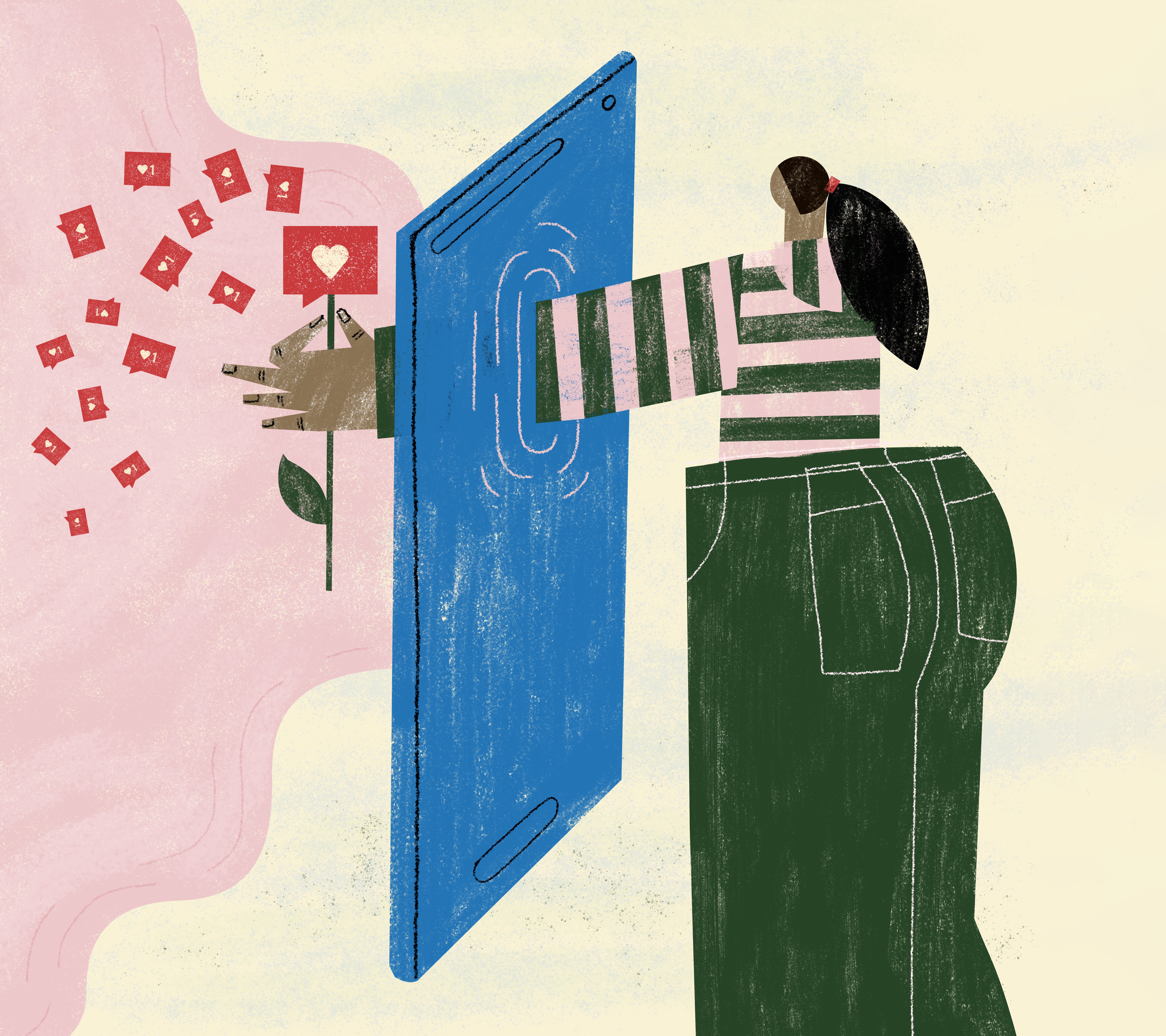Like any self-respecting member of modern society, I have a love-loathe relationship with my phone. Voice memos and meme swaps help me feel closer to my favorite people (like my brother who lives 3,000 miles away), map apps make my not-great sense of direction an endearing quality versus a liability, and I’m not sure I’d be able to fully shake off the workday (or get ready in the morning) without a podcast pumping through my Bluetooth speaker. On the loathing side of the spectrum, the constant barrage of pings and dings certainly doesn’t help my anxiety, texting and answering emails sometimes prevents me from giving my full attention to my friends and family (and, occasionally, being mindful of cars and other people when I’m walking around my neighborhood—I know, I know), and that tempting little tech vixen messes with my sleep more than I’d like to admit.
I’ve fantasized about chucking my phone into a well and living a life free from banner notifications and Instagram stories—I’m a millennial; I know it’s possible. But the reality is, I’m a modern woman with a Slack-dependent job who needs to order her decaf iced almond milk latte in advance to save 10 precious minutes of the time she doesn’t have. But just because I can’t (and truthfully, don’t want to ) break up with my phone entirely, that doesn’t mean I can’t work on my relationship with it.

And the same goes for you. Here, I rounded up a bunch of helpful little tips—from experts and SELF staffers and contributors—so we can have our cake and tweet it, too. 1.
Try using DND when you’re hanging out alone. It can be all the more tempting to grab your phone and start scrolling your life away when you’re by yourself, but you deserve your undivided attention as much as your loved ones do. Putting mine on DND while I catch up on Bridgerton or work on a crossword puzzle is a little mindfulness exercise that’s significantly improved my quality of life.
Since I’m less distracted, my alone time feels so much more fulfilling—and luxurious . — Cathryne Keller, Lifestyle Director 2. Remove the color—and therefore fun—from your screen to keep compulsive scrolling in check.
If you’re trying to stay off your phone at certain times of day (like right before bed or first thing in the morning), experiment with your device’s grayscale setting. Kitten videos and recipe reels are way less fun in black and white, so removing the color from your screen can make it much less tempting , Christina Lee, MD , a psychiatrist and the regional medical director of mental health at Kaiser Permanente in Baltimore, previously told SELF. 3.
While you’re at it, take advantage of app folders. Rearrange your home screen to show as few apps as humanly possible. (Need inspo? Consider this minimalist approach , from author Courtney Carver .
) After I moved a bunch of my apps into folders, making them ever so slightly less accessible, I was shocked by how little I opened them. Turns out, I was mostly going to Instagram and X out of muscle memory, not because I truly cared to. Having to take that extra step to find an app makes it much easier to be more intentional in your usage.
—Rachel Wilkerson Miller, Editor in Chief 4. Turn off some of your notifications..
. I don’t have notifications turned on for apps that I don’t want to pull my focus—for me, that’s Instagram, TikTok, and Snapchat. I find this prevents me from getting distracted by updates during the day, and then I’ll usually do a little scrolling in the evening to catch up and see what I missed.
— Katie Gunderman, Associate Social Media Manager 5. ..
.or most of them..
. I only receive alerts for calls and texts, and even then I stick to vibration notifications. (The only time I turn on my ringer is when I’m expecting an important call.
) In the late afternoon, I take about 15 minutes to check texts, voicemails, and personal emails. It saves me the mental energy that interruptions and multitasking cause. —Westry Green 6.
...
or all of them. I don’t have any notifications on my iPhone, not even for texts—I just manually check for messages. If I get a call, my phone will make a sound, but that’s about it.
This keeps me from looking at my phone every time I get an email or a push notification from an app. —Dana Leigh Smith, Vice President, Content Lead, Conde Nast Health 7. If you must go on your phone at night, at least choose content that doesn’t jack you up.
This is unique to each person—one woman’s doomscroll is another man’s leisurely evening—but it’s important to pay attention to the types of content that get your heart racing, so you can avoid them before bed when you’re trying to wind down, Jade Wu, PhD , a board-certified behavioral sleep medicine specialist and author of Hello Sleep , previously told SELF. 8. Speaking of overstimulation, try to stick to one screen at a time—especially at night.
Dr. Wu also advises against grabbing your phone to, say, browse TikTok or shop for cute walking shoes while you’re watching a movie or streaming a show in the evening. Not only are you doubling up on melatonin-suppressing, sleep-disturbing light, but media multitasking can also be hyperstimulating for your brain, she explains, making it much harder to fall asleep.
9. If phones are causing tension in your relationship, come up with some tech boundaries together. Some couples may consider side-by-side TikTok scrolling quality bonding time, but if one person prefers phone-free meals, and the other can’t seem to stop checking their home screen at the dinner table, tension (fine, fighting) is inevitable.
The best way to resolve issues like this, according to Michelle Drouin, PhD , a psychology professor at Purdue University: Tell your partner how you feel using “I statements” (think “I feel like you’re ignoring me when you’re on your phone as I’m telling you about my day” versus “You care about that stupid thing way more than me!”) and create tech boundaries together —like setting limits for post-work scrolling or keeping your phones out of sight (and mind) at restaurants. 10. Delete work-related apps when you’re on vacation.
My relationship with my phone is not great, TBH—I’m 100% the target audience for this article. Whenever my attention isn’t fully occupied (while I’m waiting for the subway, during a commercial break when I’m watching TV, even while brushing my teeth..
.I told you I have a problem), I cycle through a quick check of my core group of apps, including work-specific ones like Slack and email. One baby step I’ve taken to break the intense hold my phone—and my workaholism—has on me is to delete these work apps from my home screen when I’m on vacation.
Out of sight, out of mind (almost). But seriously, no one needs to be checking Slack from the beach in Mexico. — Abbey Stone, Commerce Director 11.
Protect yourself from the social media comparison trap. Constantly being faced with curated videos and images of other people’s lives can make you feel like crap about yours, especially if you’re having an insecure moment. Taking stock of the times you’re most likely to fall into this comparison trap —perhaps right before bed when you’re already anxious, or when the Sunday Scaries hit—can help you avoid it, Janelle S.
Peifer, PhD , a licensed clinical psychologist and assistant professor at the University of Richmond, previously told SELF. Maybe you commit to staying off of LinkedIn (and its “I’m thrilled to announce..
.” posts) at night, or seek out specific Instagram accounts you know won’t trigger you when you’re feeling low, rather than mindlessly scrolling. 12.
Get super picky about who you follow. Just like it’s in your best interest to only spend time with people who lift you up IRL, Dr. Peifer also recommends distancing yourself from social media folks who bring you down.
Her advice: Jot down (or mentally note) the accounts you engage with most and ask yourself if they trigger insecurities or other painful emotions, like anxiety and shame. If you tend to feel worse after viewing a certain person’s post, it’s worth it to unfollow or mute them. Similarly, before you follow someone new, vet their page to see if it seems like it’ll add to—not take away from—your life.
13. Start—and end—your day without a screen in your face. I really try to not let my phone be the last thing I look at before bed or the first thing when I wake up.
Sometimes it’s inevitable (so be nice to yourself about it!), but I have a much easier time falling asleep and getting my day started without a bright flood of information in my face. If you need an easy substitute: Read a few pages of a book or move through some gentle stretches in those sleepy moments instead. –– Grace McCarty, Editorial Assistant 14.
Get into a hobby. I think it’s important to find other activities that stimulate your brain and are more fulfilling (and fun) than mindlessly scrolling or texting. I’ve always enjoyed making art and crafting , and I try to do these things a few times a week if possible.
It can really pull me away from everything on my phone and give me a nice break. I love to watercolor, journal, and crochet, but this could be anything from playing video games to doing a puzzle! — Katie Gunderman 15. Set app limits.
There are certain apps I tend to spend hours and hours on without even noticing, like Reddit and TikTok. I started setting “App Limits” (for the iPhone, you can go into Settings -> Screen Time -> App Limits, then limit yourself to using certain apps for five, ten, 30 minutes, etc.).
Of course, you can technically ignore the notification when it tells you your time is up, but having that little reminder that I’ve been scrolling too long helps me cut down on my screen time at least a little bit. —Jenna Ryu, Lifestyle Writer 16. Practice leaving your phone behind from time to time.
.. We know: What are you supposed to do with your hands? What will you listen to? And what if you see a cute dog and can’t snap a pic?! And that’s the point: Most of us are so reliant on our phones that we feel naked without them, but occasionally leaving your device behind is a great mindfulness exercise, Dawna Ballard, PhD , associate professor of communications at the University of Texas at Austin and coauthor of Work Pressures: New Agendas in Communication , previously told SELF.
Even an hour here and there (while you go for a walk with a friend, maybe, or spend time in nature on vacation) can help you appreciate what’s right in front of you—and remind you that you won’t die if you, god forbid, have to make eye contact with a stranger. 17. .
..maybe while you work out.
I leave my phone tucked away in my gym locker. Lifting is my time, and if I have my phone on the floor, I know I’ll get distracted by notifications or feel the urge to check my email. There’s something freeing about knowing that, for 45 minutes, I’m unreachable, and the only thing I need to worry about is the weight in front of me.
(Oh, and if you get a smartwatch that streams music—my current pick is the Garmin Venu 3 —you can still listen to your workout playlist sans phone!). — Christa Sgobba, Fitness and Food Director 18. Consider getting a real alarm clock.
I don’t use my phone as my alarm—instead, I rely on my Hatch alarm clock to wake me up with light. After I’m up, I listen to my favorite podcasts to keep me company while I get ready. I look forward to my little routine every morning, and it’s stopped me from doomscrolling on Instagram and TikTok before I’m fully awake.
—Sarah Felbin, Senior Commerce Editor 19. Schedule dedicated phone time. To help tame the sporadic and chaotic feeling of needing to randomly check my phone all evening to see the latest breaking news or reply to a friend, I give myself a 20-minute chunk at the end of the night to sit on my bed and have Phone Time.
I use this window to respond to all my important text messages and emails in one sitting—and to let myself (without guilt) scroll through as many Reddit threads as my allotted leftover minutes allow. —Lara Kramer, Director of Audience Development, Analytics, and Social 20. Post less.
Not only does constantly putting stuff on IG or Facebook take you out of the present moment, it also sets off a cycle: You publish, leading people to comment or DM you, which brings you back to the app to look, like, respond, etc., which just leads to more ongoing chatter. Being more judicious about what you’re sharing can really help quiet the noise and make your phone less tempting.
—Rachel Wilkerson Miller 21. Get your email off your home screen. Deleting the email app off my phone has been a complete game-changer for me.
I fell into a terrible habit of constantly refreshing my emails whenever I left my desk to walk my dog or pop into a yoga class—I’d get work messages that would send me into a stress frenzy and ruin whatever activity I was doing. With the help of my therapist, I realized I don't need to be logged in 24/7, and that it’s extremely beneficial and restorative to have some time to myself when I can’t be reached by coworkers. (Plus, I’m usually very reachable—it's not like being MIA for 45 minutes is going to destroy my career.
) — Julia Ries, Freelance Writer 22. Lean into apps that add to your life, not take away from it. I don’t think you need to totally swear off using your phone to have a better relationship with it.
Instead, try leaning into the apps that are actually bringing you joy. I’ve gotten really into birding in the last year, which has been wonderful for my mental health, and apps like Audubon (where I like to log my sightings) and Merlin Bird ID (the Shazam of bird calls) have only made my time outdoors more fun. It sounds counterintuitive, but I’m not tempted to open other apps like Instagram or TikTok when I’m using these (I’m too busy trying to figure out what kind of warbler I’m lookin’ at).
So think about how you can use your phone to better support the hobbies that keep you grounded, rather than subconsciously reaching for it when you’re not feeling super fulfilled. —Alisa Hrustic, Executive Editor 23. Fill your in-between moments with a self-care practice instead.
Lately, I’ve been trying to swap mindless screen time with something I’ve always wanted to do more of: meditate . It’s pretty much expected (and automatic) to be on your phone tapping and scrolling through “down times” like commuting, waiting in line, or sitting in a doctor’s office. Taking a few minutes to do something else, like meditation, helps me feel way more calm and relaxed than having my eyes glued to a screen, which I already do a ton of every day anyway.
—Theresa Tamkins, Health Conditions Director 24. Instead of so much texting, stay close to your favorite people with calls..
. I recently started calling people more often, instead of just texting. Walking around NYC with my face glued to my screen can be dangerous and I feel more present when I’m communicating hands-free, but more than that, I feel closer to my friends when I can hear their voices.
—Jenna Ryu 25. ..
.or voice memos. I’ve found that whenever I try to take a break from my phone, it’s not my willpower being tested—it’s that my sweet, loving pals and family can be a bit.
..needy.
(Or perhaps just have more agile fingers than I do?) And as someone with friendships across multiple time zones, voice memos have been instrumental in minimizing phone activity while still maintaining my important relationships. Instead of shooting off half-baked messages back and forth, we (mindfully) send and receive a small batch of fully fleshed updates. It’s really minimized the amount of “stuff” I need to look at on my phone and honestly, has made my friendships so much stronger .
— Julia Sullivan, Associate Health Conditions Director Related: 25 Easy Ways to Make Air Travel Easier on Your Body I’m a Sleep Specialist. Here’s the Bedtime Activity I Swear By for Better Rest 12 Little Accessories That Make Reading More Enjoyable Get more of SELF's great wellness coverage delivered right to your inbox—for free ..



















